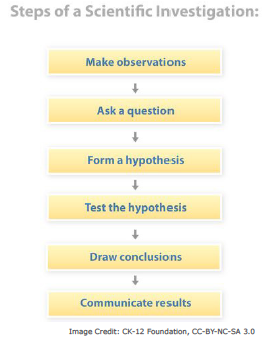Reading: Basics of Science
Key Terms
Science: A way of gaining knowledge about the natural world by asking questions and using evidence and logic to find the answers.
Observation: Something we detect with our senses.
Scientific Investigation: A plan for answering a scientific question and testing possible answers.
Hypothesis: A possible answer to a scientific question that can be tested (to be either true or false).
Evidence: Data that supports/disproves a statement.
Experiment: A special type of scientific investigation performed under controlled conditions.
Dependent Variable: Variable in a scientific experiment that is being affected by another variable (the independent variable).
Independent Variable: Variable in a scientific experiment that is manipulated to investigate its affect on another variable (the dependent variable).
Model: Representation of part of the real world.
Scientific Theory: A broad explanation of why something happens in nature that is widely accepted as true because it is supported by a great deal of evidence.
Scientific Law: Describe event that always happen under certain circumstances in nature.
Big Picture
The goal of science is to learn about the natural world.
• Science distinguishes itself from other bodies of knowledge by using logical arguments and empirical evidence to gain knowledge about the natural world.
• Science is based on assumptions about the universe.
Examples:
• Nature follows a predictable pattern that can be understood through methodical study
• Science cannot provide answers to all questions
• Scientific ideas are open to revision
• Science has limitations. Topics that can’t be proved with logic are not in the realm of science.
• Scientific knowledge accumulates over time.
• As new discoveries are made, scientific ideas (mostly hypotheses) are subject to change. Generally, these changes are small modifications to previous knowledge.
• Some scientific ideas (mostly theories) haven’t changed in hundreds of years because they haven’t been proven wrong. They are continually tested and can be revised or discarded as needed.
Scientific Investigation
Scientists conduct investigations for various reasons, such as explaining an observation and testing the conclusions of previous investigations. Scientific investigations generally follow the steps outlined below. The list of steps is not meant to be followed in a linear fashion from beginning to end; steps can be repeated or even skipped depending on the situation. Creativity, imagination, and a good knowledge base are also part of the scientific investigation.
Key points to remember:
• A hypothesis needs to be logical, based on scientific knowledge, and testable (can be supported or not supported by observational evidence).
• Scientists use rigorous methods to test hypotheses in order to ensure that their conclusions are accurate. Experiments are designed to test hypotheses. An experiment usually tests how one variable affects another variable. The independent variable affects the dependent variable. All other parameters must be controlled.
• Example: In an experiment that wants to find the effect of sunlight on plant growth, plant height= dependent variable, amount of sunlight = in-dependent variable. All other variables (such as amount of water) should be controlled.
• Other scientific investigations when experiments are not possible:
• Natural studies: studying things in nature, where scientists can’t control any variables.
• Modeling: creating a model (a representation of something) to better understand the real world.
• Accurate measurements and observations are necessary to draw plausible conclusions.
Hypotheses vs. Theories
• Scientific theories are well-established and are generally accepted to be true, but they can change as new discoveries are made.
• A hypothesis (or a group of related hypotheses) has to be tested many times and needs a lot of supporting evidence before it becomes a theory.
• Theories have almost always been verified by multiple independent scientists to ensure accuracy.
• If an observation does not agree with an accepted scientific theory, either the observation is mistaken or the theory is wrong. More experimentation is necessary before a conclusion can be made.
